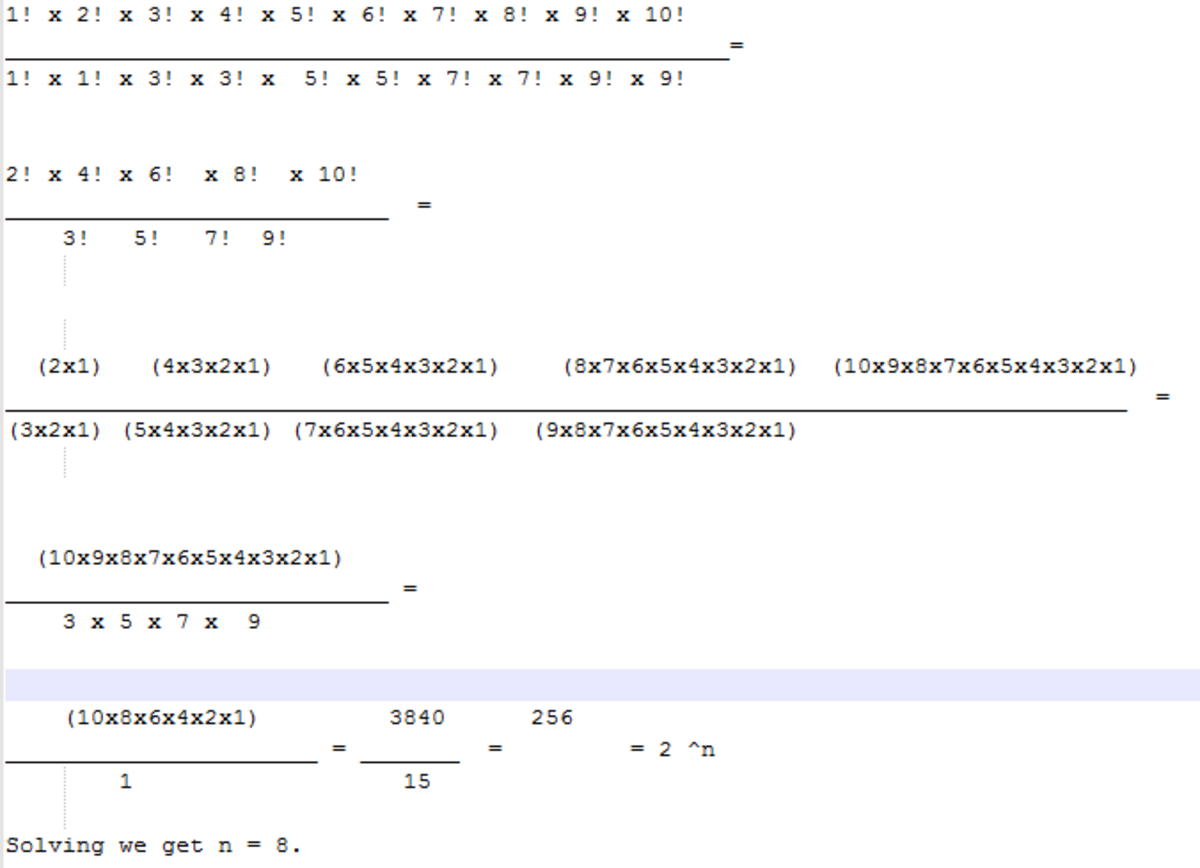Fiery Factorials!
( 1 ! ) 2 ( 3 ! ) 2 ( 5 ! ) 2 ( 7 ! ) 2 ( 9 ! ) 2 1 ! × 2 ! × 3 ! × ⋯ × 1 0 ! = 1 5 × 2 n
What is the value of n such that it satisfy the equation above?
The answer is 8.
This section requires Javascript.
You are seeing this because something didn't load right. We suggest you, (a) try
refreshing the page, (b) enabling javascript if it is disabled on your browser and,
finally, (c)
loading the
non-javascript version of this page
. We're sorry about the hassle.
10 solutions
Moderator note:
Thanks for generalizing this problem. Splendid. Bonus question: Can you state P M in terms of a multifactorial notation?
@Prasun Biswas , we really liked your comment, and have converted it into a solution. If you subscribe to this solution, you will receive notifications about future comments.
I really like your solution.
First, to simplify a little: ( 1 ! ) 2 ( 3 ! ) 2 ( 5 ! ) 2 ( 7 ! ) 2 ( 9 ! ) 2 1 ! × 2 ! × 3 ! × ⋅ ⋅ ⋅ × 1 0 ! = ( 3 ! ) 2 ( 5 ! ) 2 ( 7 ! ) 2 ( 9 ! ) 2 2 ! × 3 ! × ⋅ ⋅ ⋅ × 1 0 ! Now to rearrange: = 3 ! × 3 ! × 5 ! × 5 ! × 7 ! × 7 ! × 9 ! × 9 ! 2 × 3 ! × 4 × 3 ! × 5 ! × 6 × 5 ! × 7 ! × 8 × 7 ! × 9 ! × 1 0 × 9 ! All of the colors cancel each other out and you are left with: = 2 × 4 × 6 × 8 × 1 0 = 2 × 2 × 2 × 2 × 3 × 2 × 2 × 2 × 2 × 5 = 2 8 × 1 5 □
Moderator note:
Because the factorials in the fractions are still rather small, is it possible to find a systematic way to simplify the fraction with factorials, if there's more terms in the factorial? i.e.:
( 1 ! ) 2 ( 3 ! ) 2 ( 5 ! ) 2 ( 7 ! ) 2 × … × ( 9 9 ! ) 2 1 ! × 2 ! × 3 ! × ⋯ × 1 0 0 ! = 2 A × B !
The numerator can be paired into an even factorial and an odd factorial (ex: 9!10!). This can be rewritten as 9!9!x10 or (9!)^2 x10. If we rewrite all the numerator pairs as such we get 1!1!x2 x 3!3!x4 x 5!5!x6 x 7!7!x8 x 9!9!x10. All the factorials cancel with the denominator leaving 2x4x6x8x10. Rewritten as primes we fet 2x(2x2)x(2x3)x(2x2x2)x2x5=15x2^8
I don't really understand it...can you explain more detail. It seems interesting..
Simplify this we get (2!×4!×6!×8!×10!)/(1!×3!×5!×7!×9!)=15×2^n Where 2!/1!=2 lly we get above step 2×4×6×8×10=15×2^n 2×4×2×8×2=2^n Then left side we can change Base 2 form 2^8=2^n Finally we got d ans n=8
On solving we will get( 2 4 6 8 10)/15. On simplifying we'll get 256 which is none other than 2^8. Therefore the required answer is 8.
(2! X 4! X 6! X 8! 10!) / (1! X 3! X 5! X 7! X 9! X 15) = 256 = 2^8
Exponent of a prime p(here 2) in a factorial of n is given by Ep(n!) = floor(n/p) + floor(n/p^2) + ......... so on since 15 in RHS does not resolve to 2 as a factor n will contain all the power of 2 of LHS. Now find power of 2 for each factorial using above formula. Ep(2!) = 1 Ep(3!) = 1 Ep(4!) = 3 Ep(5!) = floor(5/2) + floor(5/4) + floor(5/8) = 2+1+0 = 3 Ep(6!) = 4 Ep(7!) = 4 Ep(8!) = 7 Ep(9!) = 7 Ep(10!) = 8
Now calculate power of 2 in each factorial for numerator it will be (1+1+3+3+4+4+7+7+8) = 38 For denominator it will be (1+1+3+3+4+4+7+7) = 30
Ans = 38-30 = 8
jus observe and mind does all the math and gives 8 3:)
15 x 2^n = 1! 2! 3! 4! 5! 6! 7! 8! 9! 10!/ 1! 3!3! 5!5! 7!7! 9!9! = 2! 4! 6! 8! 10!/ 3! 5! 7! 9! = 2! 4 6 8 10 = 15 x 2^8

[Response to Challenge Master Note on Louis W's solution]
A bit of observation tells us that the following product P M (for positive integer M ) can be generalized and used for evaluating both the original problem and the one in the note.
P M = n = 1 ∏ M [ ( 2 n − 1 ) ! ] 2 n = 1 ∏ 2 M n ! = n = 1 ∏ M ( 2 n − 1 ) ! n = 1 ∏ M ( 2 n ) ! = n = 1 ∏ M ( 2 n − 1 ) ! ( 2 n ) ! = n = 1 ∏ M ( 2 n ) ⟹ P M = n = 1 ∏ M ( 2 n ) = ( n = 1 ∏ M 2 ) ( n = 1 ∏ M n ) = 2 M × M !
Our original problem is P 5 = 2 5 × 5 ! = 2 5 × 1 2 0 = 2 8 × 1 5 .
The problem in the note is P 5 0 = 2 5 0 × 5 0 !
We used a few trivial product identities and the following almost trivial identity: